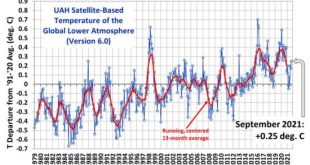UMass Amherst, UPenn analysis suggests invoking ethical legal responsibility would possibly assist
College of Massachusetts Amherst

Watkins and her co-author discovered that after folks had mirrored on previous sacrifices they have been much more likely to document feeling a way of ethical legal responsibility to long term generations. They then requested whether or not they’d be prepared to pay a better tax or make different exact sacrifices of their day-to-day lives to assist long term generations maintain local weather alternate, however On this they discovered no impact, however there was once a powerful correlation between a way of ethical legal responsibility to long term generations and willingness to sacrifice for the surroundings. Credit score UMass Amherst
AMHERST, Mass. – Probably the most extra complicated issues dealing with social psychologists as of late is whether or not any intervention can transfer folks to modify their habits about local weather alternate and protective the surroundings for the sake of long term generations.
Now researchers Hanne Melgård Watkins on the College of Massachusetts Amherst and Geoffrey Goodwin on the College of Pennsylvania document after their contemporary experiments that an intergenerational reciprocity way ¬- asking folks to mirror on sacrifices made previously through others for his or her receive advantages as of late – would possibly generate gratitude and a way of ethical legal responsibility to folks someday.
Main points in their research exploring this are on-line now within the magazine Character and Social Psychology Bulletin revealed through the Society for Character and Social Psychology.
As Watkins says, “The query is the best way to encourage folks to maintain long term generations. Different researchers have proven that reciprocity is usually a robust motivator. If any individual does one thing for my receive advantages, that creates a way of legal responsibility to reciprocate, but when I will be able to’t reciprocate immediately for some reason why, I may as a substitute attempt to “pay it ahead.” In our experiments, we attempted to take that concept and scale it as much as get folks to really feel an ethical legal responsibility to long term generations through having them mirror on what folks in earlier generations had executed for them.”
She provides that intergenerational reciprocity analysis has proven that this way can paintings, no less than with folks taking part in video games. “If the ultimate player in a recreation paid their winnings ahead, persons are much more likely to do the similar for the ones coming alongside after them.”
Total, Watkins and Goodwin, who carried out this find out about whilst Watkins was once at UPenn, state that “our research printed that such mirrored image – on sacrifices made through previous generations – predicts and reasons a heightened sense of ethical legal responsibility in opposition to long term generations, mediated through gratitude. On the other hand there also are some downsides, as an example, emotions of unworthiness, and perceptions of legal responsibility don’t considerably have an effect on pro-environmental attitudes or motivations.”
Additional, “whilst reflecting on previous generations’ sacrifice can generate a way of intergenerational legal responsibility, it’s restricted within the extent to which it might building up pro-environmental worry.” Watkins provides, “Feeling is something, if truth be told doing is some other.”
With local weather alternate, the researchers be aware that that they had selected a relatively extensive subject “extra far-off and diffuse” than some others investigated in earlier research on intergenerational reciprocity. Thus their survey requested respondents to mirror on previous sacrifices made through their households or others all over the reasonably transparent sacrifices made reminiscent of within the Nice Melancholy, International Conflict II, or through folks who scrimped and stored to position kids thru school; “large sacrifices that can not be immediately reciprocated,” Watkins notes.
For this paintings, she and Goodwin carried out 5 experimental on-line research the place no less than 200 contributors and now and again as many as 500, have been requested to put in writing reflections on both sacrifices made through previous generations or, for the keep an eye on situation, to put in writing on style alternatives made through previous generations. Topics have been American citizens, part male, part feminine and although the pattern was once “no longer consultant however a reasonably smartly various inhabitants,” Watkins issues out. A minimum of one of the crucial 5 research was once a replication of the primary survey.
They discovered that after folks had mirrored on previous sacrifices they have been much more likely to document feeling a way of ethical legal responsibility to long term generations. “We then requested whether or not they’d be prepared to pay a better tax or make different exact sacrifices of their day-to-day lives to assist long term generations maintain local weather alternate,” Watkins notes. “On this we discovered no impact,” however there was once a powerful correlation between a way of ethical legal responsibility to long term generations and willingness to sacrifice. “This correlation would possibly exist with none intervention,” she provides.
After all, Watkins studies that during a mini-meta-analysis in their 5 experiments, they did follow a small however vital impact on willingness to make sacrifices for the surroundings after reflecting on others’ previous sacrifices.
“It’s great that this may make a distinction, nevertheless it’s no longer transparent whether or not it’s sufficiently big to make use of, to put into effect as an intervention,” she issues out. “We really feel it’s treasured to have explored the query, but when you need motion on local weather alternate you may well be higher served through attempting one thing else. Possibly touch your native consultant.”
###
 Daily News Latest trending news
Daily News Latest trending news




